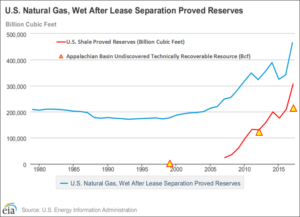by David Middleton, October 8, 2019 in WUWT
I had the good fortune of working with Jim Reilly at Enserch Exploration back in the 1980’s and early 1990’s… Before he became a NASA astronaut and then Director of the USGS.
“Shale” comprises more than 60% of current U.S. proved natural gas reserves… The Marcellus/Utica comprise about 50% of “shale” proved reserves… And the undiscovered technically recoverable resource potential of the Marcellus/Utica is now larger than the proved reserves and nearly as large (70%) as the current proved reserves of all “shale” plays….
…
 Figure 2. “The effects American ingenuity and new technology can have.”…
Figure 2. “The effects American ingenuity and new technology can have.”…
by Roger Pielke, October 7, 2019 in Forbes
Underlying discussion and debate of climate policies are computer models that bring together idealized representations of policies, economics and climate to estimate the impacts of future climate change and the benefits of mitigation. Such models, typically called integrated assessment models, are incredibly technical and complex. At the same time, they are also simplistic toys. Here I argue that while these models are valuable for exploring concepts and ideas, they have come to serve as a huge distraction when it comes to the development of actual policies that have a chance to accelerate rates of decarbonization in the real world.
Before proceeding, it is important to note that climate change poses real risks to our collective future, and aggressive mitigation and adaptation policies make good sense. However, the pace of progress, particularly on mitigation, has been frustratingly slow.
One way that integrated assessment models warp our discussion of climate policies is through the pervasive use of what are called “baseline scenarios.” These scenarios seek to represent where the world may be headed into the future in the absence of climate policies. Here is how the Intergovernmental Panel on Climate Change (IPCC) defines such scenarios, and their role in evaluating futures with climate policy (called “mitigation scenarios”):
…
…
Methodological debates are of course common in policy research. But in no area of policy that I have encountered over the past 30 years as a policy researcher have I come across a subject matter both as important as climate change and completely captured by one school of thought.
Scenario planning has an important role to play in the tool box of policy analysts. However, in the case of climate change, scenarios generated by integrated assessment models have overwhelmingly become the main tool of analysis in climate policy, to the exclusion of other valuable approaches. The result of this methodological myopia is that much of our collective intellectual attention has been spent on trying to figure out how to address climate change in models, and not in the real world.
by Uutiset, October 8, 2019 in ClimateChangeDispatch
Environmental NGO WWF Finland has apologized for using a retouched photo of a polar bear and cub standing on a tiny ice floe, apparently adrift in an ocean.
However, the organization’s communications head, Anne Brax, also defended the use of the image as an advertising tool commonly used as shorthand for climate change and its impact on arctic regions, rather than as a news item.
The photo was used as part of an anti-climate change fundraising campaign aimed at students participating in Finland’s annual “taksvärkki” or “day’s work” program, where middle schoolers work for a day to collect money for worthy causes.
The image used in the campaign was originally shot by nature photographer Steven Kazlowski and depicts a polar bear and a cub. In the original photo, however, the polar bears are set against an icy landscape with no ocean in sight.
Alongside the manipulated image used in the WWF Finland campaign is the text “sulaa hulluutta kun ilmasto lämpenee”, which roughly translated means “pure madness as the climate warms”, with a play on the word “sulaa”, which also means “to melt” in Finnish.
WWF Finland: “We Made A Mistake”
…
La géologie, une science plus que passionnante … et diverse
Figure 2. “The effects American ingenuity and new technology can have.”…
